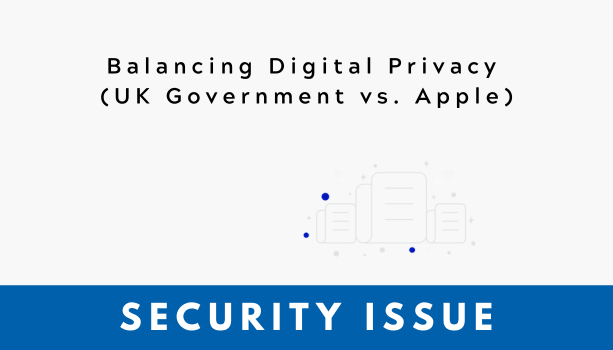[Security Issue] Balancing Digital Privacy (UK Government vs. Apple)
The UK government’s recent demand for access to encrypted data from Apple has drawn global attention. This conflict represents more than a dispute between a government and a tech company. It symbolizes the fundamental tension between digital privacy and national security in the modern era. The issue is being closely monitored by both the European Unions and the U.S. government, and major tech companies such as Google and Meta are also watching with great interest, aware of the potential implications for their own data policies. But what exactly prompted the UK government to request access to Apple’s encrypted data?

Balancing Digital Privacy
The Online Safety Bill and the Start of a Global Debate
Through the Online Safety Bill, the UK government is seeking the authority to detect and block illegal content on messaging apps, primarily focusing on child sexual abuse material(CSAM) and terrorism related content. The government’s request includes access to end-to-end(E2E) encrypted messaging services like Apple’s iMessage, bringing it into direct conflict with the fundamental principles of encryption.
The UK government argues that national security and public interest must take precedence. To effectively combat serious crimes occurring in digital spaces, particularly those targeting children or involving terrorism, it insists that law enforcement must be able to access encrypted communications when necessary, following legal procedures. The government emphasizes that this level of access is essential for ensuring public safety in the digital age and insists that tech companies must bear greater responsibility for illegal activities occuring on their platforms, including providing technical cooperation when required.

Balancing Digital Privacy
Apple : “Privacy is a Core Company Value”
In response, Apples has firmly opposed the UK’s demands. The company maintains that protecting user privacy is a core corporate value and that compromising encryption integrity under any circumstances is unacceptable. Apple warns that the creation of backdoors, as requested by the government, poses a serious threat to overall system security. Once such a backdoor exists, it could potentially be exploited by malicious actors, putting all users’ personal information at risk. Apple further argues that privacy and data security are fundamental human rights in modern society, and that ensuring these rights is part of a tech company’s broader social responsibility.
However, Apple has recently made the decision to withdraw certain security features from its UK users. This means that some of the data stored in UK users’ iCloud accounts will no longer be fully encrypted. Instead, only standard encryption will apply, allowing Apple to access the data and share it with law enforcement if presented with a valid warrant.
How is this issue being viewed by civil society and experts? Privacy advocacy groups have expressed concern that expanding government surveillance powers could infringe on fundamental individual rights and potentially pave the way for broader future surveillance. Security experts approach the issue from a technical perspective, warning that any form of backdoor inherently introduces vulnerabilities. They argue that even backdoors created for specific legal purposes could eventually be discovered and exploited by hackers, endangering the safety of the entire digital ecosystem. Legal scholars are examining the implications of such demands on international and human rights law, sparking discussions about how legal systems around the world should adapt to these new challenges.
The way encrypted data is stored and processed has become one of the most pressing issues of the digital era. It is no longer just a technical matter. It requires complex discussions across social, legal, and ethical dimensions. The clash between the UK and Apple illustrates just how difficult it is to strike a balance between national security and personal privacy. One particularly notable aspect is Apple’s unprecedented decision to pull advanced encryption services from an entire country. This sets a rare precedent in which a major tech company has opted to withdraw services entirely in response to a single nation’s legal demands, and it could significantly influence similar conflicts in the future.
In light of this, governments and corporations around the world must work toward finding a sustainable balance between national security and individual privacy, while ensuring that civil society’s voices are adequately represented. The establishment of international standards and guidelines for handling encrypted data is becoming increasingly urgent—and such frameworks must evolve alongside technological progress. The UK–Apple case is likely to serve as a critical reference point in ongoing discussions around digital privacy and security.
Balancing Digital Privacy
* Would you like to learn more?
We invite you to discover how we can help your business.

